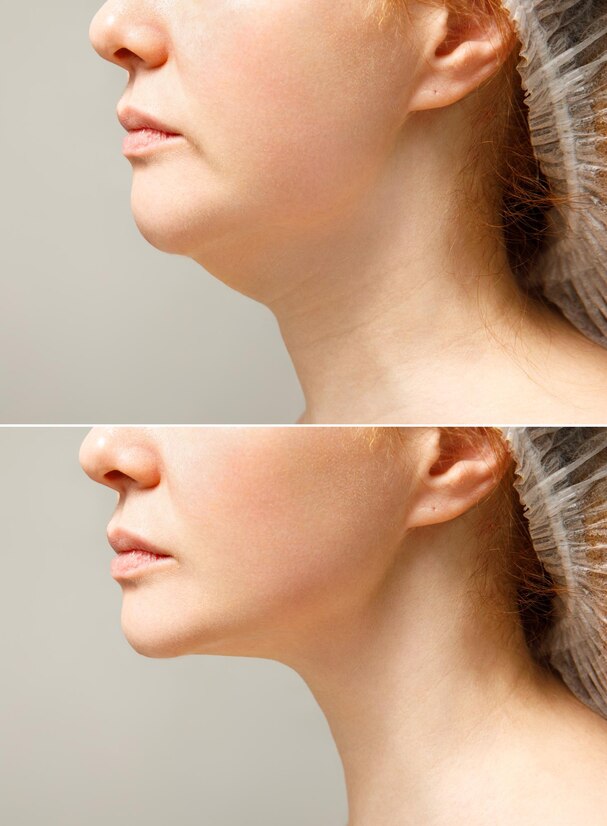What Is Genioplasty?
A genioplasty refers to a surgical procedure performed to modify the appearance of the chin. This surgery can be done for both reconstructive purposes related to the chin or jaw, as well as for the sake of improving the aesthetics. In cases where individuals experience issues with their upper airways, a genioplasty may be recommended by a doctor. Plastic surgeons are usually the ones who carry out this procedure.

Which conditions can be corrected with genioplasty?
Genioplasty is a suitable solution for individuals facing issues related to their chin. These problems may consist of:
- Facial disharmony caused by certain types of chin deformities present from birth, including condylar hyperplasia, extension of one side of the lower jaw, asymmetrical facial development, and abnormalities in bite and skeletal structure.
- An enlarged chin (macrogenia)
- Microgenia refers to a chin that is abnormally small or misshapen.
- A chin that is weak, set back, or less prominent (retrogenia).
- A notable, jutting, or exaggerated lower jaw (also known as mandibular prognathism)
- A jaw that is set back and an overbite (retrognathia)
- A double chin and full lower face
- An ageing neck and jawline
- Improving tongue position and opening the airway can correct sleep apnea.
Types of genioplasty

Sliding Genioplasty
The procedure known as sliding genioplasty is typically employed to rectify a chin that is either set back or improperly aligned.
A cut in the shape of an upside-down V is created, starting from one canine tooth to another on the opposite side of the teeth. Then, a saw that moves back and forth is utilized to detach the chin bone from the remaining part of the jaw, ultimately fixing the misalignment issue in the jaw.
Chin implants
Chin implants are employed to alter the shape, size, or projection of the chin, and this can be achieved through surgical procedures or injections.
The procedure of surgical chin augmentation involves the insertion of a synthetic material into the chin and then attaching it to the bone. Alloplastic implants, which are constructed from artificial substances, are commonly used for this purpose.
Non-surgical chin augmentation refers to the process of injecting substances, like body fat, into the chin using needles, with the aim of improving its aesthetic appeal.
Chin reduction surgery.
This process can reduce the size of your chin or create a more balanced appearance. It is beneficial when your chin is noticeably protruding. Your physician will use the same incisions as with a chin augmentation, but instead of adding substances, they will remove excess bone. Afterward, they will shape your chin according to the desired outcome you previously discussed.
Vertical Genioplasty
A vertical genioplasty is the perfect option to either increase or decrease the height of the chin. It is used when there are differences in facial height between the lower, middle, and upper parts of the face. To enhance the vertical height, bone or bone graft material is added and secured using small plates and screws.
Procedure
Before getting a chin augmentation procedure, individuals are advised to undergo a clinical assessment with a qualified surgeon.
In a consultation, a surgeon will examine a person’s medical background and current wellbeing. They will inquire about the individual’s goals and expectations for the treatment.
The face of the individual will be assessed by the surgeon, who will then proceed to capture X-ray and CT scans of their jaw.
After the surgeon determines the most appropriate choice, they can provide suggestions and begin organizing the process.
When it comes to a sliding genioplasty, the process includes determining the precise location and angle for cutting the chin bone. Additionally, the medical team must assess the necessary personnel and equipment needed for this procedure.
When surgeons are preparing for an implant augmentation procedure, they will make a choice on whether to utilize implants, filler injections, or a combination of both. Additionally, they will take into account the specific material of the implant as well as the fillers.
Typically, individuals should refrain from consuming solid food for a minimum of 6 to 8 hours prior to undergoing surgery. However, they are allowed to consume clear liquids up until 2 hours before their surgical procedure.
General anesthesia is necessary for chin augmentation surgeries. While patients may be discharged after the procedure, they must make transportation plans in advance.
What can I expect after the operation?

It may come as a surprise that the operation is not very painful, but it is still expected to cause some discomfort. We will provide you with regular painkillers. The feeling of discomfort is typically more intense during the initial days, although it may take a few weeks to completely go away.
In order to ensure proper healing without any infections, it is crucial to receive antibiotics intravenously during your stay at the hospital. After your treatment, you will be provided with pain medication and possibly a prescription for antibiotics, which you can take at home.
Shortly after the surgery, you may experience swelling and a sensation of tightness in your chin. The severity of swelling and bruising may differ, but typically, it is most pronounced on the second or third day following the operation. To alleviate swelling, applying cold compresses and sleeping with your head elevated for a few days can be helpful. While the majority of swelling subsides within two weeks, it is common to have slight swelling that may persist for several months. However, this is usually only noticeable to you and your loved ones.
Recovery
It may take a few weeks to fully recover from a sliding genioplasty. For a few days after the procedure, it is important to refrain from engaging in strenuous activities. Swelling and bruising might be present for approximately two weeks. To prevent any infection during the healing process of your mouth, your surgeon will likely prescribe antibiotics for you.
After the surgery, your surgeon may suggest you follow a diet of liquids or soft foods for a few days. It is important to refrain from consuming hard or crunchy foods, as they have the potential to cause damage to your stitches or aggravate the incision.
Keeping your incision clean can be ensured by rinsing your mouth with salt water both before and after eating your meals.
Typically, the discomfort experienced following a sliding genioplasty is generally not severe. To alleviate this discomfort, one can use over-the-counter pain medication and apply cold compresses. Additionally, it is advised to sleep with the head elevated above the heart in order to minimize swelling in the chin and lip area.
The majority of individuals typically return to their usual activities, including exercise and work, within a period of seven to 10 days following their procedure.
Having Genioplasty in Turkey?
The patient must carefully search for an appropriate service provider, have information, and ask about the surgeon and his experience. And also, checking examples of his previous operations.
Accordingly, we encourage you to contact the Health & Beauty to obtain all information and details, and to ensure that you have your operation done by the hands of the most skilled doctors working in this specialty.

